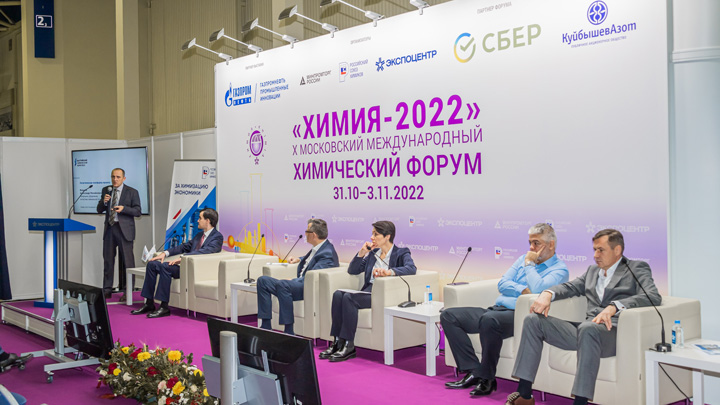Chemical triathlon at Khimia 2022
The Russian Chemists Union jointly with EXPOCENTRE AO organised the Chemical triathlon within the Khimia 2022 exhibition and the 10th Moscow International Chemical Forum.
The triathlon included 3 main thematic sessions: “The digital track: accelerating the digitalisation of enterprises”, “Logistics track: new trends in chemical logistics”, “Environmental track: answers to today's eco challenges”.
All three stages were moderated by Evgeny Sinyakov, Vice-President of the Russian Chemists Union. Starting the digital track, he noted that digitalisation is fundamentally different from the usual automation of chemical companies. Digitalisation brings with it new elements in both management and technology. The objective of the first track, he said, was to show examples of the economic effects of digitalisation, to outline key points of what industry companies need to do when digitalising, and to introduce the audience to Russian digital solutions that are available today.
Vadim Schemelinin, Head of Industry 4.0, spoke about digital transformation at SIBUR. Speaking about the economic effect of implementing digital technologies, he said, in particular, that SIBUR expects to obtain 59 billion rubles in aggregate economic effects by 2025 through digitalisation.
Olga Pervushina, Managing Director - Head of Key Client Transformation Directorate of Sberbank, which works closely with chemical industrial companies, Alexey Bondarenko from IT Directorate of Uralchem, Sergey Vinogradov, Deputy Director for IT of Apatit (PhosAgro group) and other experts also shared their digital solutions application experience.
The participants in the logistics track, in their turn, discussed the peculiarities of the chemical products supply chain turnaround to the East, the safety and quality issues of chemical logistics in the new realities, the technological equipment of the logistics infrastructure.
In particular, Maria Suslonova, Director of Logistics, ProPartners Group, noted in her speech that the sanctions policy and restrictions imposed by hostile countries have led to a reduction in transportation capacity, including the ability to transport hazardous chemical goods. The cost of import and export shipments of chemical products has increased by 20-30%, and their cost has risen by 40-50%.
In this challenging environment, Russian chemical companies are developing new logistics routes and markets, and new transport corridors are being created. In particular, non-resource exports to Southeast Asia are being developed. Companies in the industry are moving away from their dependence on one supplier and are seeking to increase their sustainability. The development of local production of basic commodity and specialty chemicals is being accelerated.
The environmental track was dedicated to "Dynamics of the Climate Agenda in Russia", "Decarbonisation Projects for Chemical Enterprises", and "Tools for the Development of the Environmental Field of a Chemical Enterprise".
According to Ilya Danilov, representative of Sberbank, the cost of environmental protection measures in the chemical industry has been steadily increasing. In 2021, the total spending of our country's 10 largest chemical enterprises for these purposes exceeded 34 billion rubles, which exceeds the budget of, for example, a city such as Kazan. Almost every fifth chemical company has planned to implement practices that reduce their environmental impact in 2022. However, in the absence of economic and regulatory incentives, most Russian enterprises continue to rely on the availability of raw materials and are not interested in reducing their carbon footprint, implementing environmental protection measures and investing in the development of low-carbon technologies.
A number of other speakers also drew attention to this. Leading experts from SIBUR, Uralkali, Kekston and the RUSNANO Group also took part in the discussion.
Press Service, EXPOCENTRE AO



